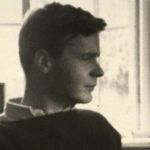As the morning advanced the sun became bright and warm, cloudless, calm, serene. About nine an appearance very unusual began to demand our attention—a shower of cobwebs falling from very elevated regions, & continuing, without any interruption, till the close of the day . . .
There is a natural occurrence to be met with upon the highest part of our down in hot summer days, and that is a loud audible humming of bees in the air, though not one insect is to be seen . . .
In a district so diversified as this, so full of hollow vales and hanging woods, it is no wonder that echoes should abound. Many we have discovered that return a tunable ring of bells, or the melody of birds; but we were still at a loss for a polysyllabical, articulate echo, till a young gentleman, who had parted from his company in a summer walk, and was calling after them, stumbled upon a very curious one in a spot where it might least be expected . . .
We procured a cuckoo, and cutting open the breastbone and exposing the intestines to sight, found the crop lying as mentioned above. This stomach was large and round, and stuffed hard, like a pincushion, with food, which upon nice examination, we found to consist of various insects, such as small scarabs, spiders, and dragon-flies; the last of which, as they were just emerging out of the aurelia state, we have seen cuckoos catching on the wing. Among this farrago also were to be seen maggots, and many seeds, which belonged either to gooseberries, currants, cranberries, or some such fruit . . .
All nature is so full, that that district produces the greatest variety which is the most examined . . .
Gilbert White
1
Upon First Opening a Cuckoo
I saw the sweet-briar & bon-fire & strawberry wire now
relaxed into intricate thicket.
It was as if seen in strong sunlight, flat
& tapestried, all edge & definition. Here, an airy bone shaped
like a plowshare, there, vibratory membranes within a space
from which the song must come: a syrinx (hollow
pipes of reeds) now silent
in return to the ‘Salliter’ of earth.
Little more than
a drift of air, brought
into form by plumes.
Mulch to stone.
Yeast of the clouds.
2
What the Earth Told Me
No surface is allowed to be bare,
& nothing to stand still. A man could forever study a pebble
& at last see dilations & expansions of the hills—
to pull the most slender stalk, is to jostle the stars,
& between the bearded grass
& man ‘looking in the vegatable glass
of Nature’, is a network of roots & suckers
fine as hairs.
I threw a stone upon a pond
& it bounded the surface, its circles interlacing
& radiating out to the most ephemeral edge.
Flint & Mica, Lichened Limestone, Shale & Sarcens, Sandstone, Soil.
I saw the wind moving on a meadow
& the meadows moving under wind—
lifting, settling & accumulating.
Flint & Mica, Lichened Limestone,
Shale & Sarcens, Sandstone, Soil.
3
What the Air Told Me
It is breathed into Orpheus’ lyre & as rocks & trees & beasts
is divided there. Its origins strain
precedes the sound, by as much as echoes follow after:
the quivering of ‘cow-quake’, a ‘loud audible
humming of bees on the down’, stresses within the sustaining earth,
clouds of fleece & mare’s tail.
I saw with single eye, the facet of the fly—
the infinitesimal mechanics & all the metallic sheens
of a blue-bottle. In a land where the sun grows fat on cloud
& summer hasn’t come
till your foot can cover twenty daisies,
she came to the dark, open beak
& laid a myriad of eggs. And in two day’s time the dead
bird’s body simulated life: maggots in eye-socket &
under feather, in a subtle movement.
The White & The Glistening.
4
What the Leaf Told Me
today I saw the word written on the poplar leaves.
It was ‘dazzle’. The dazzle of the poplars.
As a leaf startles out
from an undifferentiated mass of foliage,
so the word did from a leaf—
A Mirage Of The Delicate Polyglot
inventing itself as cipher. But this, in shifts & gyrations,
grew in brightness, so bright
the massy poplars soon outshone the sun . . .
‘My light—my dews—my breezes—my bloom’. Reflections
In A Wren’s Eye.
5
De Vegetabilibus
For there are splendors of flowers called DAY’S EYES in every field.
For one cannot walk but to walk upon sun.
For the sun has also a stem, on which it turns.
For the tree forms sun into leaves, & its branches & saps
are solid & liquid states of sun.
For the sun has many seasons, & all of them summer.
For the carrot & bee both bless with sun,
the carrot beneath the earth & the bee with its dusts & honies
For the sun has stippled the pear & polished the apple.
6
De Animalibus
For there are owls in the air & moles in the earth
& THEY ALSO have eyes.
For there are shapes of air which are OWL
& shapes of earth which are MOLE,
& the moles brings air to the earth & the owl, earth into air.
For the turtle’s back is another firmament & dappled like the cloud.
For there are birds who nest on the earth
& are feathered in its form.
For the rook & the worm are only one cycle out of many.
For man rejoices with rook & worm
& owl & mole & turtle,
& they are only one cycle out of many.
7
Turner, Constable & Stubbs
To see,Turner had himself lashed to the ship’s mast
& Constable sat still in the fields
till something came—a bird—‘some living thing appropriate to
the place’. He noted the wind’s direction, pile
of clouds, the time of day. Stubbs
fixed an iron bar to the ceiling of his room, with hooks
of various sizes & lengths, in order to suspend the body of a horse.
The horse remained for six or seven weeks
‘until no longer endurable’.
The form of muscles, blood vessels & nerves was retained
by tallow injections—Stubbs methodically
cutting to the skeleton, making full length drawings
& studies of the ear & nose.
‘He was possessed of great physical
strength, being able,
it is said, to carry a dead horse on his back
to a dissecting room,
at the top of a narrow flight of stairs’.
The work was finished in eighteen months.
8
Natural Productions, Occurrences & Antiquities
‘August is by much the most mute month’, yet,
the air may be so strongly electric
that bells may ring & sparks be discharged in their clappers:
‘put a bird in motion, et vera incessu patuit . . .’
To distinguish a bird by its ‘air’, to ‘hear’
the buoyant owls—woodpeckers rising & falling in curves
—the perpendicularity of skylarks . . .
Gilbert White quotes from the Latin: He preferred
the sounds of birds to those of men. The music of men left his mind
disturbed by engaging his attention
with its rise & fall, while the warbling
of birds left no such hold
‘to tease my imagination & recur irresistibly
at seasons . . . ’
All day the cobweb fell silently
in the air, till whole
baskets-full lay round about, & still
more descending.
9
The Leaves of Southwell
Maple & hawthorn & oak. Crow-foot & cinquefoil
(Aubrey’s Midsummer silver?).
Vine & ivy & hops. rose, bryony (a Mandrake), geranium, mulberry,
wormwood. Fig, bittersweet & blackthorn.
It is an assemblage (a community?) including its dragons with
crisply carved acorns.
Two hounds devour a hare. A bird seizes a grape with its
beak. Both green men & the winged
fruit of maple are in hierarchy of accuracy—the ribbed & the delicate
ascending to the general. But here, a throat
come aleaf, there a branch held aloft.
And a kind of greening speech comes from those mouths
all but winged—each leaf
cleft & articulate. Southwell, of the leaves
of limestone: trefoil, quatrefoil, cinquefoil (as foil means
leaf): a ‘burnisht corall’ & geranium
brain: cranesbill, crow-foot: blackthorn & whitehorn,
quickthorn, Jack-in-the-green:
a man cleft, as Mandrakes, the ‘man-shaped
dragon’, Mandragora.
10
Exhibit from Frederik Ruysch’s Anatomical Museum
A skeleton balances an injected spermatic plexus
in one hand & a coil of viscera
in the other. Minatory assortments
of calculi of all sizes
occupy the foreground. In the rear, a
variety of injected vessels, backed by an inflated & injected
tunica vaginalis,
combined to form a grotesque & arboreal
perspective. Another skeleton,
in extremis, is grasping a skeleton
of that emblem of insect mortality, the mayfly, & a third
is performing
a composition ‘expressing the sorrows of mankind’
on a violin, symbolized
by bundles of arteries & a fragment
of necrotic femur.
Bones are arranged to represent
a cemetery—wrists are adorned with organic & injected
frills—& human, comparative
& pathological exhibts
are mingled, as the exigencies of space required.
11
‘Unless the Humming of a Gnat is as the Music of the Spheres
& the music of the spheres is as the humming
of a gnat . . . ’ A spectre came, transparent-winged,
out of the interstices of light,
& shadow went up like smoke & everywhere
the hills were as clouds over valleys of water, rippling
& reverberating.
And before him the sands of the beach swarmed as insects, close-knit
in electrical flight . . .
‘For MATTER is the dust of the Earth,
every atom of which is the life.
For the flames of fire may be blown thro musical pipes’.
And everywhere the hills were as clouds over
valleys of water, rippling
& reverberating.
12
What the Light Told Me
It is now a circle, now a spiral or wheel.
It merges with the eye, with a wing or a sickle-shaped horn.
It takes on the form of beasts—a dragon, fish, or bird.
As an orb, at summer soltice,
it balances on the altar-stone at Stonehenge—
& as beam, expands, elongates, twists & ‘attenuates
itself into leafen gold
as a covering for the quince’.
With arc & parabolic
& serpent-oblique—‘muscial in ocular
harmony’. Expanding, elongating, twisting
& attenuating.
An encompassing eye.
Within and out, round as a ball—
With hither and thither, as straight as a line.
Slight as a fox-whisker,
spiraled, twined—rayed as chicory-flower.
Within and out, round as a ball—
With hither and thither, as straight as a line.
With lily, germander
And sops-in-wine. With sweet-briar and
Bon-fire and strawberry wire
And columbine.


















Comment form: